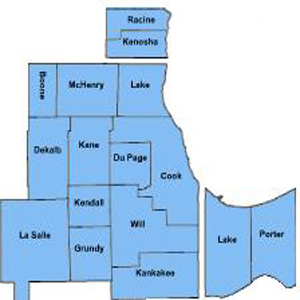From the Right: Declaring for the next election
This yearâs election is in the books. Time to look at the next election. But does it really matter?
By Justin Shimko
(Note: This column was scheduled to publish on November 25. Events in Ferguson, however, prompted a delay in publishing)
With the Treasurerâs race finally completed and a State House seat ultimately decided with just over 100 votes between the two candidates, securing the Democrat supermajority in that chamber, we have now arrived that the time many voters dread: the next election.

Mike Quigley easily won the 2014 race without serious opposition. Will 2016 be more of the same? (Photo credit: Wikipedia)
Not quite over the previous election (Louisianaâs runoff is this Saturday), 2016 prospects are already looking at the numbers for signs they, too, should run for office. There has been talk about some of those who lost elections just over two weeks ago to seek a rematch against the victors, including one we touched upon just after the election in Illinoisâ 10th District, where Brad Scneider is exploring a third bout against former-Congressman-turned-Congressman-elect Bob Dold. This doesnât include the many candidates who are exploring runs for President, which will turn into the circus race guaranteed to eclipse all other races by the time Santa arrives next winter.
Which means it is important to take a hard look at running in the 5th Congressional District of Illinois. Just a couple weeks ago, Rep. Mike Quigley “squeaked” by Republican Vince Kobler 63-30 margin. Kobler appeared a nice-enough guy, flashing his grandfatherly smile on his billboards with the trite slogan of “More Jobs” emblazoned as you fought through the Lincoln Avenue curve towards Foster during most morning rush hours. His websiteâs slogan “Heâs for Us” had the unique ability to tell us nothing about his campaign and everything about the state of politics in Chicago.
For Quigley, he joined the rest of the Congressional incumbents in Chicago of enjoying a primary with no challenger and a general election with no serious candidate to run against. It was even more laughable for Quigley because not only did he run unopposed in the primary, but the Republican opponent garnered only a handful of votes last March.
Frederick White, the only declared candidate for the March 2014 primary received fewer than 50 votes that day. Why so low? Because he wasnât actually on the ballot.
When filing began in 2013, White filed to run in the primary despite living outside of the district. While that is not a requirement for eligibility, it usually prompts someone - somewhere - to challenge your nominating petitions and question whether you should be on the ballot. Rather than face the process of standing up to a challenge in the State Board of Elections, White dropped from the race and filed a petition to run as a write-in candidate. The only official tally I could find was in DuPage County, which records him receiving seven votes. None were listed in Suburban Cook County or the City of Chicago.
After that dismal showing, and having failed to officially nab the nomination, the GOP put up their sacrificial lamb of a candidate in Kobler. While I am sure Kobler held strong to the Republican values important to conservatives in the 5th Congressional, the method to which he was able to land on the ballot for November leaves a lot to be desired in the district.
Thatâs why I think I should run. Whether I can actually make a difference in the outcome from one of the few elected Democrats known for trying to cut actually money from the bloated budgets in Chicago and Cook County is unknown. But having a challenger who is willing to stick their neck out on the line for a primary and general election, who actually qualifies for the office, and wouldnât allow petition challenges to get in the way of the ability for this run is a lot better than the district was able to do this time around.
Sadly, however, itâs not that easy. No one but sacrificial lambs and deluded people actually make a run as a Republican in a district drawn so heavily Democratic that it would take a monumental scandal to see a Republican win, and even then the poor sap will be soundly defeated two years later when the Democrats put up a candidate with a pulse. Just ask Michael Patrick Flanagan. Weâre still paying the price for his defeat in 1996.
Districts, and parties, are so tightly organized to wipe away any real option for those in office. Instead of making every office have the potential of receiving a Too Close to Call rating just before - or on - Election Day, party leaders draw lines to ensure their friends and political allies stay in office as long as they donât end up mired in scandal.
Itâs not easy to draw those lines in a liberal city like Chicago, but then you rely on the party to adjust the political positions to allow a viable Republican run in Chicago. Instead of labeling the candidate a RINO (Republican in Name Only) because they espouse agnostic positions on social issues guaranteed to doom a campaign from the start or they focus on the Republican positions that can resonate in an urban dwelling (such as fiscal restraint), the party should support the candidate as the only possibility to beat a guy like Quigley.
But we donât see these changes. Instead, we see Republicans dominate in sparsely-populated states, with the occasional surprise in large states, while Democrats practically enjoy a 99-year lease on the population-bulging bastions. Look at California, where nearly 65 percent of the Legislature hails from the Left. The Republican Party hardly made a dent in this election. Right here in Illinois was worse. When the legislature convenes in January, party breakdown will change by only one seat in the Senate where the GOP needed a four-seat flip to regain some semblance of a voice. In Oklahoma, where two-thirds of the legislature is occupied by Republicans, the election didnât end the same. Many of the races were effectively decided in the August primaries, where Republicans held contested races for many of the open seats but the incumbents (again) saw little to no challenge.
These types of elections are defeating the whole purpose of elections in our republic. The democratic part of our Constitution is dying by the legal gerrymandering witnessed nearly everywhere. Those who directly benefit from the redrawn lines after every census hunker down in some backroom and compile a map that maximizes the party in control with no regard to the concept of equality or fairness. Then we sit back and wonder how the same “crazy clowns” (as I had a friend call them the other day) get reelected, blaming money, PACs and other spoils of elections.
Instead of blaming the vehicles candidates use to win office, how about blaming the drivers? How about pushing for changes to redistricting the requires a third-party organization to draw the lines and forcing the districts to be as challenging to incumbents as possible? At the very least we need to have a third party draw the lines that are supposed to give us an idea of what democratic republicanism looks like.
It couldnât hurt, right?
Justin Shimko is an award-winning writer and political analyst. He began as a reporter in his college days at the University of Oklahoma, writing for The Oklahoma Daily (rated as one of the best collegiate newspapers in the nation) and The Oklahoman, the statewide newspaper, winning awards from the CSPA and the Society of Professional Journalists. He later moved on to research and writing work for a number of political campaigns. His email is
[email protected]
Latest posts by Justin Shimko (see all)
Related
 Blog Posts
Blog Posts






From the Right: Declaring for the next election
This yearâs election is in the books. Time to look at the next election. But does it really matter?
By Justin Shimko
(Note: This column was scheduled to publish on November 25. Events in Ferguson, however, prompted a delay in publishing)
With the Treasurerâs race finally completed and a State House seat ultimately decided with just over 100 votes between the two candidates, securing the Democrat supermajority in that chamber, we have now arrived that the time many voters dread: the next election.
Mike Quigley easily won the 2014 race without serious opposition. Will 2016 be more of the same? (Photo credit: Wikipedia)
Not quite over the previous election (Louisianaâs runoff is this Saturday), 2016 prospects are already looking at the numbers for signs they, too, should run for office. There has been talk about some of those who lost elections just over two weeks ago to seek a rematch against the victors, including one we touched upon just after the election in Illinoisâ 10th District, where Brad Scneider is exploring a third bout against former-Congressman-turned-Congressman-elect Bob Dold. This doesnât include the many candidates who are exploring runs for President, which will turn into the circus race guaranteed to eclipse all other races by the time Santa arrives next winter.
Which means it is important to take a hard look at running in the 5th Congressional District of Illinois. Just a couple weeks ago, Rep. Mike Quigley “squeaked” by Republican Vince Kobler 63-30 margin. Kobler appeared a nice-enough guy, flashing his grandfatherly smile on his billboards with the trite slogan of “More Jobs” emblazoned as you fought through the Lincoln Avenue curve towards Foster during most morning rush hours. His websiteâs slogan “Heâs for Us” had the unique ability to tell us nothing about his campaign and everything about the state of politics in Chicago.
For Quigley, he joined the rest of the Congressional incumbents in Chicago of enjoying a primary with no challenger and a general election with no serious candidate to run against. It was even more laughable for Quigley because not only did he run unopposed in the primary, but the Republican opponent garnered only a handful of votes last March.
Frederick White, the only declared candidate for the March 2014 primary received fewer than 50 votes that day. Why so low? Because he wasnât actually on the ballot.
When filing began in 2013, White filed to run in the primary despite living outside of the district. While that is not a requirement for eligibility, it usually prompts someone - somewhere - to challenge your nominating petitions and question whether you should be on the ballot. Rather than face the process of standing up to a challenge in the State Board of Elections, White dropped from the race and filed a petition to run as a write-in candidate. The only official tally I could find was in DuPage County, which records him receiving seven votes. None were listed in Suburban Cook County or the City of Chicago.
After that dismal showing, and having failed to officially nab the nomination, the GOP put up their sacrificial lamb of a candidate in Kobler. While I am sure Kobler held strong to the Republican values important to conservatives in the 5th Congressional, the method to which he was able to land on the ballot for November leaves a lot to be desired in the district.
Thatâs why I think I should run. Whether I can actually make a difference in the outcome from one of the few elected Democrats known for trying to cut actually money from the bloated budgets in Chicago and Cook County is unknown. But having a challenger who is willing to stick their neck out on the line for a primary and general election, who actually qualifies for the office, and wouldnât allow petition challenges to get in the way of the ability for this run is a lot better than the district was able to do this time around.
Sadly, however, itâs not that easy. No one but sacrificial lambs and deluded people actually make a run as a Republican in a district drawn so heavily Democratic that it would take a monumental scandal to see a Republican win, and even then the poor sap will be soundly defeated two years later when the Democrats put up a candidate with a pulse. Just ask Michael Patrick Flanagan. Weâre still paying the price for his defeat in 1996.
Districts, and parties, are so tightly organized to wipe away any real option for those in office. Instead of making every office have the potential of receiving a Too Close to Call rating just before - or on - Election Day, party leaders draw lines to ensure their friends and political allies stay in office as long as they donât end up mired in scandal.
Itâs not easy to draw those lines in a liberal city like Chicago, but then you rely on the party to adjust the political positions to allow a viable Republican run in Chicago. Instead of labeling the candidate a RINO (Republican in Name Only) because they espouse agnostic positions on social issues guaranteed to doom a campaign from the start or they focus on the Republican positions that can resonate in an urban dwelling (such as fiscal restraint), the party should support the candidate as the only possibility to beat a guy like Quigley.
But we donât see these changes. Instead, we see Republicans dominate in sparsely-populated states, with the occasional surprise in large states, while Democrats practically enjoy a 99-year lease on the population-bulging bastions. Look at California, where nearly 65 percent of the Legislature hails from the Left. The Republican Party hardly made a dent in this election. Right here in Illinois was worse. When the legislature convenes in January, party breakdown will change by only one seat in the Senate where the GOP needed a four-seat flip to regain some semblance of a voice. In Oklahoma, where two-thirds of the legislature is occupied by Republicans, the election didnât end the same. Many of the races were effectively decided in the August primaries, where Republicans held contested races for many of the open seats but the incumbents (again) saw little to no challenge.
These types of elections are defeating the whole purpose of elections in our republic. The democratic part of our Constitution is dying by the legal gerrymandering witnessed nearly everywhere. Those who directly benefit from the redrawn lines after every census hunker down in some backroom and compile a map that maximizes the party in control with no regard to the concept of equality or fairness. Then we sit back and wonder how the same “crazy clowns” (as I had a friend call them the other day) get reelected, blaming money, PACs and other spoils of elections.
Instead of blaming the vehicles candidates use to win office, how about blaming the drivers? How about pushing for changes to redistricting the requires a third-party organization to draw the lines and forcing the districts to be as challenging to incumbents as possible? At the very least we need to have a third party draw the lines that are supposed to give us an idea of what democratic republicanism looks like.
It couldnât hurt, right?
Justin Shimko
Latest posts by Justin Shimko (see all)
Share this:
Related